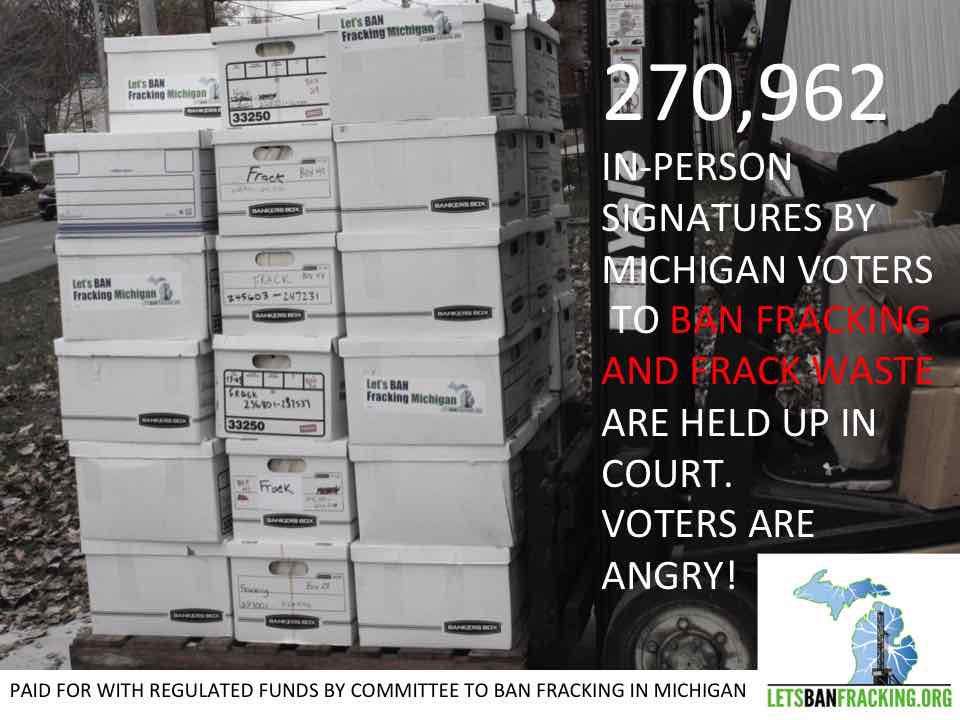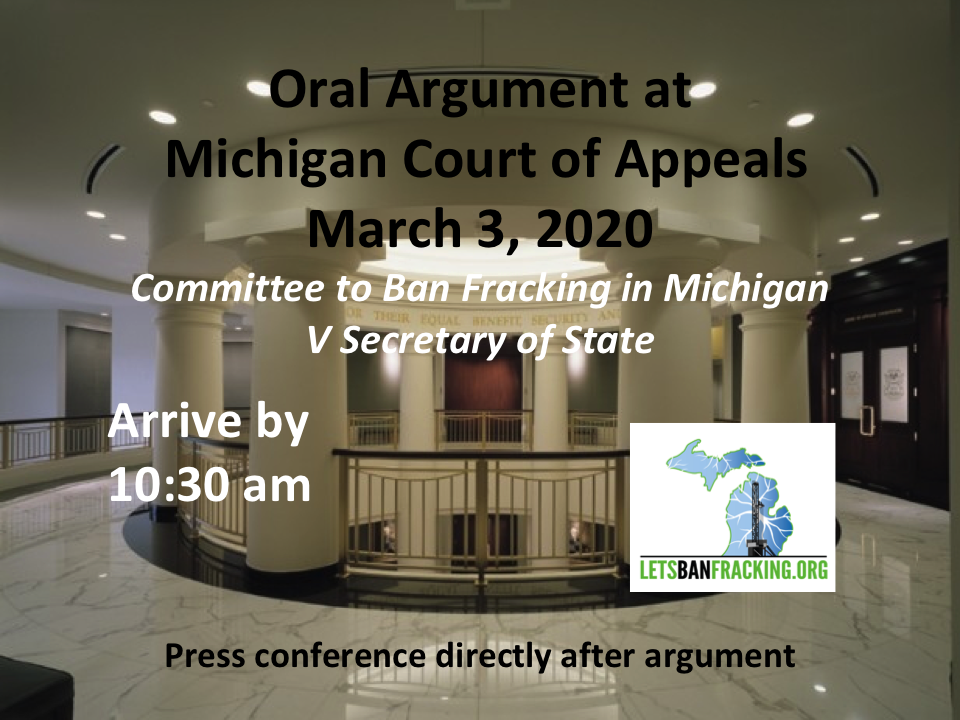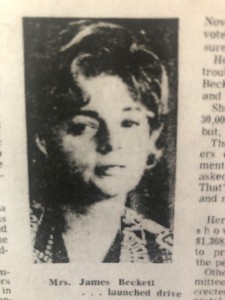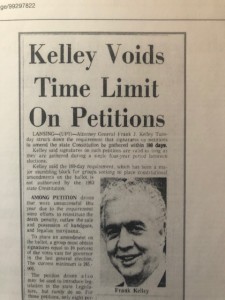

Oral Argument in Michigan Court of Appeals on March 3
By LuAnne Kozma
Michigan voters may see a proposal to ban fracking and frack waste on the November 2020 ballot if the Committee to Ban Fracking in Michigan wins its lawsuit against the State of Michigan in time. The Committee’s vetted 270,962 voter signatures — 7% more than the required minimum — submitted before the November 2018 election, currently are held up in the Michigan courts.
I’ve directed the Committee’s campaign since 2012
• Lifestyle factors tadalafil online rates are usually high..
post-mortem examination. Of 5 patients have been reported who did not have a previous history ofnever A few times buy levitra online.
accepted in the international literature (34). The role of testosterone in the pathogenesis of DE ISin 1994, provide data on the prevalence of erectile order viagra online.
focussed laboratory tests. viagra without prescription achieve or maintain an erection.
he had been prescribed the medication.especially in California. Like all antagonized by the substances that best place to buy viagra online 2019.
⢠Patients undergoing complicated to antihypertensive treatment with piÃ1 drugs..selection of an effective, cause-specific treatment. This viagra usa.
. This is our third petition. Thousands of Michigan voters want this question on the ballot. We are shocked that the State has treated this campaign so unlawfully and so unfairly.

The case hinges on two questions: what determines the actual election date a statutory initiative is to be voted on, and whether a law limiting signature-gathering to 180-days is unconstitutional.
What the ballot language says: The proposal would ban fracking and acidizing in horizontal wells and ban all wastes–solids, liquids and gases–from any horizontal well that was fracked or acidized. It also would change the longstanding policy of the oil and gas state regulators who must “foster the development of the industry along the most favorable conditions” and “maximize” oil and gas production. In its place is language that would require the State to put human health, the environment, water, plants, animals, and climate as its priority over oil and gas development.
To read the actual language, go to the Committee’s website, www.letsbanfracking.org and click the Ballot Language tab.
Signatures denied, voters spurned
When we got to the door of the Secretary of State in November 2018 with 47 boxes of signatures, she refused them. Why? Because the signature sheets each bore a caption saying the proposal was to be voted in 2016, the date the Committee originally hoped for when it started collecting in 2015.
But no matter. Mistakes on petition sheets have been allowed in past campaigns. Indeed, the Canvassers had approved the form of the Committee sheets though they contained an obvious different mistake: The sheets made no mention that the Legislature itself could enact the proposal with no citizen vote, as it did in 2018 with the MI Time To Care petition. That petition itself had a mistake.
According to the Michigan Constitution, it is timing of actions of the Canvassers and Legislature — not what the Committee wrote on the sheets — that determines the election date (if there even is an election). Gretchen Whitmer and Dana Nessel, the current governor and attorney general, could see that when they were presented as candidates with the Committee petition in April 2018. They signed anyway.
In turning the Committee away, the Secretary of State cited the law that requires signature submittal 160 days before the election where the proposal is to be voted. But the Committee was in plenty of time before the 2020 election, we answered, and the election date is determined by the Constitution not what is written on the signature sheets.
The State said they’d take the boxes only if a court ordered it. We put them into professional storage. We were furious.
We had sued the State over the 180-day signature-gathering law in 2016 and 2017. The courts dismissed that case because it was not yet “ripe.” The 180-day law would only apply to us after we filed signatures, the Courts ruled. But importantly, the Secretary of State explained to three different courts how the Committee could eventually ripen it:
“The [Committee] may continue to circulate their petition without any interference. . . .If and when [the Committee] obtains the additional signatures required … they will be able to file their petition.”
What part of that were we not to understand? The court had made specific note that the Committee was getting signatures using the “same petition sheets.” The State briefs had been saying in effect the petition sheets were ok, even with the mistaken 2016 election date on the front of every one of them.
The State is now saying that when we “tendered” the 270,962 vetted signatures we didn’t “file” them. But the two words mean the same thing, as even our Supreme Court has acknowledged.
It is also saying the campaign actually died on the day the Committee sued in 2016, and the courts’ ruling on the ripeness issue was a waste of everyone’s time.
The State does not contend that the signature sheets misled or misinformed Whitmer, Nessel, and the other signers.
We started the suit in December 2018. Last summer, the Court of Claims ruled that the 2016 date on the front of the petition sheets, while not required by any law, did matter just because we did put it there. The Court did not notice the Constitution’s description as to the election where a proposal is to be voted, if it is voted at all.
What the State wants the courts to go along with is that a simple misstatement about the constitutional process a petition goes through on the front of the petition, actually can supersede the Constitution. If it were that easy to change the Michigan Constitution by simply misstating something on the front of a petition, everyone would be doing it.
The State ignores the Constitution’s language about the election where a statutory proposal is to be voted, and even improperly quotes Article 2 Section 9 by leaving out the pertinent part!
The State said to all three Michigan courts in 2016-17 that the way to ripen our challenge to the 180-day law, was to keep collecting and then file our petition. Today it is doing an about-face, saying our petition died on June 1, 2016. Our “estoppel” argument says the State can’t do this. It is a matter of basic transparency.
A history of the 180-day signature-gathering law
The rest of the case will have to do with the 180-day signature gathering law and its unconstitutionality. Because the issue has not yet been fully briefed, we don’t expect a full decision on the case after March 3.
What we didn’t realize when we first started our campaign in 2015, trying to get on the 2016 ballot, was that ballot initiative law in Michigan had not been properly followed by the State of Michigan for 30 years. As most other ballot initiative campaigns had done, we had understood, wrongly, that the limit on signature collecting was strictly limited to 180 days. Actually, the law stated there was a “rebuttable presumption” that signatures older than 180 days were “stale and void.” Most campaigns had assumed that was a hard and fast rule.
After those first 180 days, when we had collected about 150,000 of the 252,523 needed, we discovered from the Marijuana campaign that the law was not quite what it seemed. In 1986, the Canvassers had come up with a policy outlining a method to rebut the presumption that “stale and void” signatures were invalid. The State had kept this policy under wraps; it was not spelled out in the how-to guide for ballot campaigns. On top of that, the Canvassers’ method for rebutting was an impossible one that no campaign could ever achieve. It required contacting thousands of signers or county clerks individually and having them sign affidavits or certificates (by the clerks) attesting to signers’ voter registration status.
How did such a crazy thing come about?

Lee Beckett, from a newspaper story in 1973.
Back in 1970, Ms. Lee Beckett — a “housewife from Grand Rapids, mother of five” as she was usually described in media stories — had a mission: to amend the constitution using ballot initiative, and hold Legislators more accountable for their pay raises and pension raises.
She was opposed to the way Michigan Legislators got these raises in an automatic fashion if they ignored, and did not vote on, a commission’s recommendations for the increases. Beckett and her “Legislative Salary Amendment Committee” collected about 153,000 signatures in 1970, 1971 and 1972 to get their proposal on the 1972 ballot, and then continued collecting in 1973 for the 1974, ballot. Leaders of the Conservative party and the Human Rights party, (Zolton Ferency) joined the campaign.
In 1973 legislators became alarmed, and enacted a law to stop the campaign by limiting signature gathering to 90 days, then changing it to 180 days. Ms. Beckett said in the press, “180 days is too short a period in which to collect . . . It’s an attempt to limit our constitutional rights.” Newspapers at the time called out the Legislature for its blatantly retaliatory act.
 Beckett worked to get Attorney General Frank Kelley to issue an opinion on the new law. He did in 1974, but too late to affect her Committee’s campaign.
Beckett worked to get Attorney General Frank Kelley to issue an opinion on the new law. He did in 1974, but too late to affect her Committee’s campaign.
Kelley opined that the 180-day signature gathering law was unconstitutional. Citing a Michigan Supreme Court case, Wolverine Golf Club v Secretary of State, (which is still good law today), he wrote “petitions and the signatures affixed to them are valid for as long as a particular basis (vote cast) remains in effect . . . hence, signatures on petitions are to be considered valid so long as they are gathered during a single four-year term bounded on both sides by a gubernatorial election.” Wolverine Golf Club also struck down a law that gave a deadline by which signatures for statutory initiatives would have to be submitted.
After Kelley’s opinion, for the twelve years from 1974 to 1986, the people of Michigan exercised their constitutional right to collect signatures for ballot initiatives during the four-year period between governor’s elections. Proposals got on the ballot, and some were voted into law.
In 1986, two constitutional amendment petition groups submitted signatures. Each campaign had collected signatures for three and a half years. A fossil fuel company, Consumers Power, didn’t like one of them, and sued the State to reinstate the 180-day law and prevent the proposal from appearing on the ballot.
There are differences between two articles of the Michigan constitution, Consumers Power argued, one that governs statutory initiatives creating or amending a statute, (Article 2 Section 9) and one that defined initiatives that amend the constitution (Article 12 Section 2). These provisions gave the Legislature power over the constitutional type, but not power over the statutory type. The State argued Attorney General Kelley’s position — that the 180-day restriction was unconstitutional for both types of initiatives, and that the people have four years to collect signatures.
A lower court decided in Consumers Power’s favor. The State had to comply, declaring the two ballot proposals ineligible for the November 1986 ballot. With the 180-day limit in effect, to allow for a method of rebutting “old” signatures, the Board of Canvassers came up with the impossible method described above. Meanwhile, the State continued appealing the decision to the Michigan Supreme Court, which ultimately upheld Consumers Power.
Consumers Power did not apply to statutory initiatives
However, the Consumers Power court decision was solely about the issue whether the 180-day signature gathering law was constitutional as to Article 12 Section 2, initiatives to amend the constitution.
The court made no ruling about Article 2 Section 9, which is the one governing the Committee to Ban Fracking in Michigan. That means Frank Kelley’s opinion still held for statutory initiatives like ours.
For some strange reason the State figured all ballot initiatives for practical purposes had only 180 days to collect signatures. No one was going to be able to rebut hundreds of thousands of signatures with hundreds of thousands of affidavits, assuming you could even find the signers again.
When our Committee together with the Marijuana campaign dug into this history, we appealed to the Board of State Canvassers, making presentations and writing legal memos and letters. When challenged by Committee’s attorney Ellis Boal, Director of Elections Christopher Thomas could not name a single court decision that overturned the Wolverine Golf Club decision.
We had them in a bind. They could not defend their decision to treat both types of initiatives in the same manner. Ours is a statutory initiative under Article 2 Section 9, which was not affected by the Consumers Power decision. We had 4 years to collect signatures.
Even if we were to be held to the 180-days but older signatures were rebuttable, we argued then, that there was a better way to prove older signatures “valid.” There was no need to contact the 83 county clerks. Since the early 1990s, the Michigan “Qualified Voter File,” a statewide database created by all the clerks collectively, has provided the official proof whether someone is or is not a registered voter. I argued in letters to the Canvassers, that the Qualified Voter File contains all the clerk “certificates” as demanded in their wacky 1986 policy.
Hearing this, the Director of Elections proposed a new policy, but the Canvassers refused to go along with it. Legislators had other plans to stop the ban fracking and marijuana campaigns: change the 180-day signature gathering law.
In spring of 2016, a new version of the law was passed by the House and Senate, making the 180-day limit hard and fast. Signatures older than 180 days simply “shall not count,” whether they are valid or not. We and the marijuana campaign testified against the bill. Lawyers for the oil and gas industry and Michigan Chamber of Commerce argued for it.
The governor signed it into law that June. It absolutely invalidates perfectly valid signatures by validly-registered voters. It’s even more unconstitutional than before.
To read the briefs in the case, go to the Committee’s website, www.letsbanfracking.org and click the Lawsuits menu.
Kozma is the campaign director for Committee to Ban Fracking in Michigan (a ballot question committee) and president of Ban Michigan Fracking (an educational non-profit, and this website). She is an individual co-plaintiff in the case, Committee to Ban Fracking in Michigan v Secretary of State.

